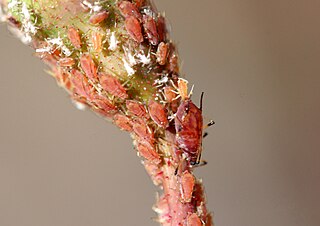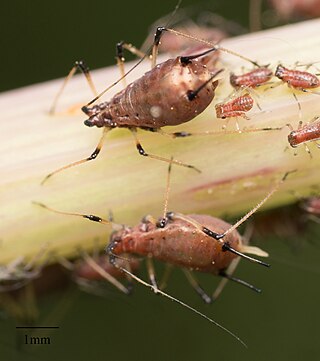
Coccinella transversalis, commonly known as the transverse ladybird or transverse lady beetle, is a species of ladybird beetle found from India across southern and southeastern Asia to Malesia and Australia. It is not to be confused with Coccinella transversoguttata, a widespread species in Europe and North America also known as the transverse ladybird. The alternative vernacular of small transverse ladybird may be used for C. transversalis in instances where these two species are discussed together.

Rhopalosiphum maidis, common names corn leaf aphid and corn aphid, is an insect, and a pest of maize and other crops. It has a nearly worldwide distribution and is typically found in agricultural fields, grasslands, and forest-grassland zones. Among aphids that feed on maize, it is the most commonly encountered and most economically damaging, particularly in tropical and warmer temperate areas. In addition to maize, R. maidis damages rice, sorghum, and other cultivated and wild monocots.

Macrosiphini is a tribe of aphids in the subfamily Aphidinae.

Sitobion avenae, the English grain aphid, is an aphid in the superfamily Aphidoidea in the order Hemiptera. It is a true bug and sucks sap from plants. It lives on grasses, sedge and rushes and can be a significant pest of cereals.
Sitobion lambersi, also known as Sitobion (Sitobion) lambersi, is an aphid in the superfamily Aphidoidea in the order Hemiptera. It is a true bug and sucks sap from plants.
Sitobion leelamaniae, also known as Sitobion (Sitobion) leelamaniae, is an aphid in the superfamily Aphidoidea in the order Hemiptera. It is a true bug and sucks sap from plants.
The Indian grain aphid, also known as Sitobion (Sitobion) miscanthi, is an aphid in the superfamily Aphidoidea in the order Hemiptera. It is a true bug and sucks sap from cereal plants, making it a pest of wheat production. It has also been recorded as a pest of finger millet, sorghum, and pearl millet in South Asia.
Sitobion phyllanthi, also known as Sitobion (Sitobion) phyllanthi, is an aphid in the superfamily Aphidoidea in the order Hemiptera. It is a true bug and sucks sap from plants.

Uroleucon sonchi is a species of aphid in the family Aphididae. Known as the large sow-thistle aphid, it is a native of Europe, and has been introduced to several other countries. It principally feeds on the sow thistle but is also a pest of cultivated lettuce, and so is also known as the brown lettuce aphid.
Hayhurstia is a genus of aphids in the family Aphididae. There is one described species in Hayhurstia, H. atriplicis.
Sarucallis, also known by its common name as the Crape myrtle aphid or Kirkaldy, is a genus of aphids in the family Aphididae. There is one described species in the genus Sarucallis and it is Sarucallis kahawaluokalanu (S. kahawaluokalani). They can grow to a body length of 1.2 to 1.8 millimeters.

Sitobion is a genus of aphids in the family Aphididae. There are more than 80 described species in Sitobion.
Capitophorus elaeagni, known generally as artichoke aphid, is a species of aphid in the family Aphididae. Other common names include the thistle aphid and oleaster-thistle aphid. It is found in Europe.

Capitophorus is a genus of aphids in the family Aphididae. There are more than 30 described species in Capitophorus.
Sitobion africanum is a species of aphid. It is a pest of millets.
Sitobion graminis is a species of aphid. It is a pest of millets.
Sitobion indicum is a species of aphid. It is a pest of millets.





